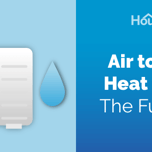Answer these simple questions and we will find you the BEST prices
Which type of solar quotes do you need?
It only takes 30 seconds
100% free with no obligation

Get up to 4 quotes by filling in only 1 quick form

Install a heat pump for less with the BUS grant

Increase the value of your home by installing a heat pump
- Householdquotes.co.uk
- Heat Pumps
- Replace Your Boiler with A Heat Pump
Replace Your Boiler With A Heat Pump: Costs, Advantages & Savings

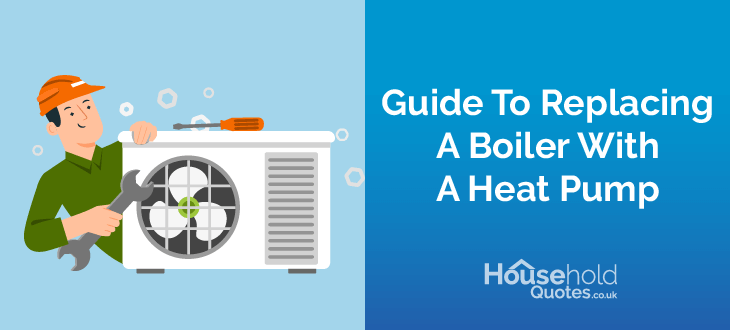
- Heat pumps are over 3 times more efficient than gas boilers, reducing carbon emissions and running costs.
- You could save up to £550 per year by replacing a gas boiler with a heat pump.
- Replacing a gas boiler with a heat pump costs between £2,400 - £49,000.
Is your boiler on its last legs? Or constantly needing repairs? The reality of a broken-down boiler can be daunting, but it also presents the perfect opportunity to upgrade to a sustainable, low-carbon heat pump.
Replacing your boiler with a heat pump offers a range of benefits, from cost savings to reduced emissions, but there are many additional details you need to know. In this article, we’ll walk you through the entire process, including key differences between these systems, installation considerations, and all the costs involved (including important tips on savings through grants!).
Ready to say goodbye to boiler drama for good and enjoy greener, easier home heating? Well, we can help! We know it’s challenging to find trustworthy installers, and it can take hours to scroll through reviews and wait for quotes, but that’s where we’ve got you covered.
Fill in our quick and easy form, and we will connect you with qualified installers in your area, all from our fully vetted network of professionals. You will then receive up to 4 free, no-obligation quotes to compare so you can find the best price.
Click the button below to get started today.
- Quotes from local installers
- Payment by finance available
- Save £7,500 with BUS grant
It only takes 30 seconds

- The differences between gas boilers and heat pumps
- Advantages of heat pumps instead of gas boilers
- What to consider when replacing a gas boiler with a heat pump
- Cost to replace a gas boiler with a heat pump in the UK
- Savings when replacing a gas boiler with an air source heat pump
- Is replacing my gas boiler with a heat pump the right choice?
- FAQ
The differences between gas boilers and heat pumps
Traditional gas boilers have served us well for decades, but heat pumps now offer a revolutionary approach to home heating. Many things set these systems apart, and understanding how they differ is crucial before making the switch.
Gas boilers burn fossil fuels to produce heat, which emits harmful carbon dioxide gases into the atmosphere. Although modern condensing boilers can perform with efficiency levels up to 94%, they still consume more gas than the heat they produce.
In comparison, a heat pump uses renewable energy sources - air, water or geothermal (underground) - and can operate with efficiencies of approximately 300%, meaning you get 3x the heat output per unit of energy consumed. Due to the renewable nature of their energy source, heat pumps also don’t directly emit greenhouse gases like a gas boiler, which lowers their environmental impact.
To get a better idea of the differences, we’ve outlined these and further points in the table below:
| Difference Between Boilers and Heat Pumps | ||
|---|---|---|
| Feature | Gas Boilers | Heat Pumps |
| Fuel source | Natural gas | Three main sources, depending on heat pump type: Air source (ambient air), Water source (bodies of water), Ground source (geothermal energy in the ground) |
| Efficiency | Approx. 90% - 94% | Approx. 300% |
| Environmental impact | Burning gas emits 0.215kg of carbon dioxide per kilowatt-hour, contributing to greenhouse gas emissions and global warming. | While their heat source is renewable, heat pumps do require electricity to operate. However, this impact can be eliminated if a renewable energy source (such as solar panels) is used to provide green power. |
| Running costs | Considered cheap to run as gas is a lower-cost fuel than electricity, but this is subject to fluctuating energy prices. | Despite higher initial installation costs, they tend to have lower running costs over time due to their higher efficiency levels. Pairing them with solar panels can further reduce running costs. |
| Installation and maintenance | They are usually quick installations, lasting 1-3 days, and require annual maintenance to ensure safe and efficient operation. | Can be complex to install, especially ground source heat pumps, which can take 2-5 days. They require less frequent maintenance, usually every 2-3 years. |
| Performance and suitability | They produce high-temperature heat quickly, making them suitable for older, less insulated buildings. They are effective in providing rapid heating. | Produce heat more slowly and at lower temperatures, working best with larger radiators or underfloor heating systems. They are best suited for well-insulated buildings and gradual temperature increases. |
| Lifespan | 10 - 15 years | 15 - 25 years |
Advantages of heat pumps instead of gas boilers
Heat pumps offer a compelling alternative to traditional gas boilers, with several advantages that can benefit your wallet and the environment. Here's a breakdown of some key benefits:
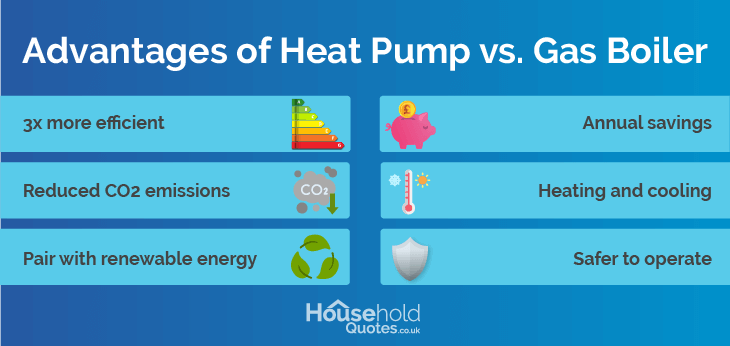
- Superior efficiency:
As mentioned earlier, heat pumps excel in efficiency. They can produce up to 3x the heat for every unit of electricity they use. This translates to significant energy cost savings compared to gas boilers. - Environmentally friendly:
Heat pumps don't directly burn fossil fuels, resulting in a much lower carbon footprint. For example, upgrading to an air source heat pump can save you up to 7,500kg of CO2 emissions. When combined with renewable energy sources like solar panels, you can create a fully sustainable heating solution. - Lower running costs:
Due to their high efficiency, heat pumps can significantly reduce your energy bills. The potential savings can vary depending on location, climate, and usage but could be up to £550 per year, making the long-term cost benefits undeniable. - Multi-functionality:
Some heat pump models offer dual functionality, providing heating and cooling capabilities. This eliminates the need for a separate air conditioning system, potentially saving on installation and operational costs. - Reduced maintenance:
Heat pumps generally require less frequent maintenance compared to gas boilers. While annual servicing is recommended for boilers, heat pumps typically only need a check-up every 2-3 years. - Safety:
Heat pumps eliminate the risk of gas leaks and carbon monoxide poisoning associated with gas boilers, creating a safer living environment.
What to consider when replacing a gas boiler with a heat pump
While heat pumps offer many advantages, it's important to consider some key factors before replacing your gas boiler. Here are some things to keep in mind:
Climate
Heat pumps work best in mild-moderate climates. In very cold regions, their efficiency can decrease as they work harder to extract heat from the cooler air. If you live in a cold environment, a hybrid system that combines a heat pump with a gas boiler might be a better option.
Home insulation
Heat pumps work best in well-insulated homes. Poor insulation forces the heat pump to work harder, reducing efficiency and potentially increasing running costs. Consider upgrading your home's insulation before installing a heat pump to maximise its benefits.
Existing heating system
The type of radiators or underfloor heating you have can impact compatibility with a heat pump. While most systems can work with heat pumps, some older radiators may require adjustments to function effectively at lower water temperatures.
Upfront costs
Heat pumps tend to cost more upfront to install than gas boilers, typically between £10,000 - £14,000. However, government incentives, such as the Boiler Upgrade Scheme, can help offset this cost with grants of £7,500 to support installation. In addition, the long-term energy savings potential can help you recoup the investment within 6 - 17 years.
Space limitations
Depending on the type of heat pump you choose - air, water or ground source - you will need to consider the amount of outdoor space you have. For example, an air source heat pump will require approximately 3m x 2m of space for the outdoor fan unit, and a ground source heat pump will require a minimum land area of 700m2 for digging trenches or boreholes.
Expert advice
Consulting with a qualified heat pump installer is crucial. They can assess your home's suitability for a heat pump, recommend the right system size, and provide estimates for installation costs.
It can be exhausting searching the web for reputable installers. Trawling thousands of reviews can leave anyone feeling confused and overwhelmed. Instead, avoid wasting hours of your time and let us help!
Simply fill in our 30-second form and get connected with our network of vetted, professional installers in your area. You’ll receive up to 4 free, no-obligation quotes to compare so you can find a price to suit your budget.
Just click the button below to get started.
- Quotes from local installers
- Payment by finance available
- Save £7,500 with BUS grant
It only takes 30 seconds

Cost to replace a gas boiler with a heat pump in the UK
When thinking about switching from a gas boiler to a heat pump, it’s important to understand the costs involved. There are some key points that will influence the overall price. These include:
- Type of heat pump
Generally, there are two types of heat pumps you might consider: air source and ground source. Water source heat pumps are also available, but they require very specific property types with direct access to a water body, so they are not always an option.
Air source heat pump prices are generally lower for installation, whereas ground source heat pumps are more expensive due to the groundwork/drilling involved.
- Installation costs
The complexity of your existing heating system and any necessary modifications will affect installation costs. For the installation alone, without supply costs, you can expect to pay between £350 and £1,700 for an air source and £3,000 to £30,000 for ground source heat pump installation.
- Home size and heat demand
The size and heat demands of your household will influence the size and power of the heat pump required. Larger properties with higher heat requirements will naturally cost more for both the unit and installation.
Here are some quick cost estimates to help you compare potential prices for replacing a boiler with an air source heat pump, a ground source heat pump or a gas boiler.
| Costs To Replace A Gas Boiler With Different Systems | |||
|---|---|---|---|
| Cost Elements | Gas Boiler | Air Source Heat Pump | Ground Source Heat Pump |
| Supply | £500 - £3,500 | £2,400 - £12,350 | £13,200 - £19,000 |
| Installation | £1,000 - £1,500 | £350 - £1,700 | £3,000 - £30,000 |
| Total costs | £1,500 - £5,000 | £8,750 - £14,050 | £16,200 - £49,000 |
It's important to remember that these are estimated ranges. The actual cost for your specific situation can vary depending on the factors mentioned above. To get the most accurate picture, consider getting quotes from qualified heat pump installers who can assess your home and provide a tailored estimate.
Are there any grants for replacing gas boilers with heat pumps?
Although the cost of installing a heat pump may seem high, there are grants and government incentives available to help. Depending on where you live in the UK, there are multiple grants you could benefit from. Since 2022, however, the main funding route has been the Boiler Upgrade Scheme (BUS).
We’ve included further details of this and other available schemes below:
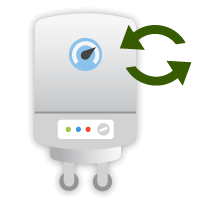
Boiler Upgrade Scheme (BUS)
This scheme provides upfront grants of up to £7,500 to help offset the cost of installing a new low-carbon heating system, including air source and ground source heat pumps. The BUS can significantly reduce the upfront investment required for a heat pump, making it a more attractive option for many homeowners. This scheme is only available however, until the end of March 2028.

Energy Company Obligation (ECO4)
This government-backed scheme requires large energy suppliers to help the most vulnerable households install energy efficiency measures. The ECO4 can help fund actions like improving insulation, repairing old boilers, and even replacing inefficient systems with low-carbon alternatives, including heat pumps.
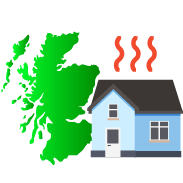
Home Energy Scotland Grant and Loan
For those living in Scotland, Home Energy Scotland provides a similar initiative to support households with energy efficiency measures. This comes in the form of a grant of up to £7,500, with the option of an additional £7,500 in the form of an interest-free loan. This can cover the costs of installing a heat pump or any other ‘clean heating system’.
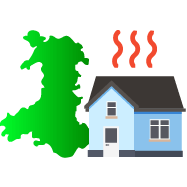
Warm Homes Wales
Similarly, if you live in Wales, the Welsh Government offers free support to install energy-efficient improvements in eligible homes - including upgrading to a heat pump.
Each of these grants and schemes has specific eligibility criteria, so it’s worth checking to see if you can benefit from any of this free support. In addition, it’s always worth speaking to a qualified heat pump installer to get the latest advice and information on available funding, as they can help support you through the application process.
Savings when replacing a gas boiler with an air source heat pump
While the upfront cost of installing a heat pump can be higher compared to a gas boiler, the long-term savings can be substantial. Firstly, since heat pumps use renewable fuels, you'll see a decrease in your reliance on gas. This can lead to impressive savings on your energy bills.
In addition, as heat pumps have high efficiency levels, often exceeding 300%, you will get more heat per unit of electricity they consume (up to 3 times!). In comparison, a gas boiler is usually around 92% efficient, meaning you actually lose 8% of the energy it uses. This difference can translate to significantly lower energy bills.
Latest figures suggest that replacing a gas boiler with an air source heat pump can save homeowners up to £166 per year. Combined with the potential lifespan of a heat pump (up to 15 years), the long-term savings can be substantial.
We’ve outlined below the estimated yearly savings when replacing your boiler with two types of heat pumps.
| Annual Savings when Replacing a Boiler* | |||
|---|---|---|---|
| House Size | Average Power/ Size Required | Air source heat pump savings** | Ground source heat pump savings*** |
| Small 1 - 2 bedrooms | 8kWh | £14 | £128 |
| Medium 2 - 3 bedrooms | 12kWh | £182 | £550 |
| Large 4+ bedrooms | 17kWh | £166 | £275 |
Is replacing my gas boiler with a heat pump the right choice?
Saying goodbye to your ageing gas boiler and switching to a heat pump is a big decision, but the range of benefits is not to be underestimated. Not only do heat pumps help to save you money, year on year, but they are also exceptional for the health of the planet.
Using a renewable energy source (extracted from the ambient air or naturally occurring heat underground), your heat pump can provide whole home heating without emitting harmful emissions.
Heat pumps are so efficient and effective that even the Government is encouraging us to use them. Grants like the Boiler Upgrade Scheme can significantly reduce the cost of installation, with a grant of £7,500, making it even more affordable to make the switch.
If you’re ready to start saving money and reducing your carbon footprint, we’re here to help! Using our quick and easy form, we can help you avoid the stress of endless research, trawling through reviews, and praying your installer is genuine.
Instead, get connected with our network of qualified, vetted installers from your area. Receive up to 4 entirely free quotes (with no obligations attached) and compare prices to find the best deal for your budget.
Click the button below to get started!
- Quotes from local installers
- Payment by finance available
- Save £7,500 with BUS grant
It only takes 30 seconds

FAQ
It costs between £2,400 – £49,000 to replace a boiler with a heat pump, with prices varying depending on the heat pump type, size and installation complexity required.
There are many advantages to replacing a boiler with a heat pump, including savings on energy bills and reduced carbon emissions. You could save up to £550 per year and between 1,600kg – 12,000kg of carbon dioxide.
Running costs can vary greatly depending on the type of boiler you replace, the heat pump you choose and the suitability of your home. There are many aspects to consider before you replace a boiler with a heat pump.
Yes! You can easily replace a combi boiler with a heat pump in most properties. However, you should always speak to a qualified heat pump installer to check that your home has the space and insulation levels for you to benefit from a heat pump.

Becky has been bringing quality advice to homeowners since 2021. As an experienced writer, she is keen to help our customers find the help they need when they need it.
- Replace Your Boiler With A Heat Pump: Costs, Advantages & Savings
- The differences between gas boilers and heat pumps
- Advantages of heat pumps instead of gas boilers
- What to consider when replacing a gas boiler with a heat pump
- Cost to replace a gas boiler with a heat pump in the UK
- Savings when replacing a gas boiler with an air source heat pump
- Is replacing my gas boiler with a heat pump the right choice?
- FAQ



